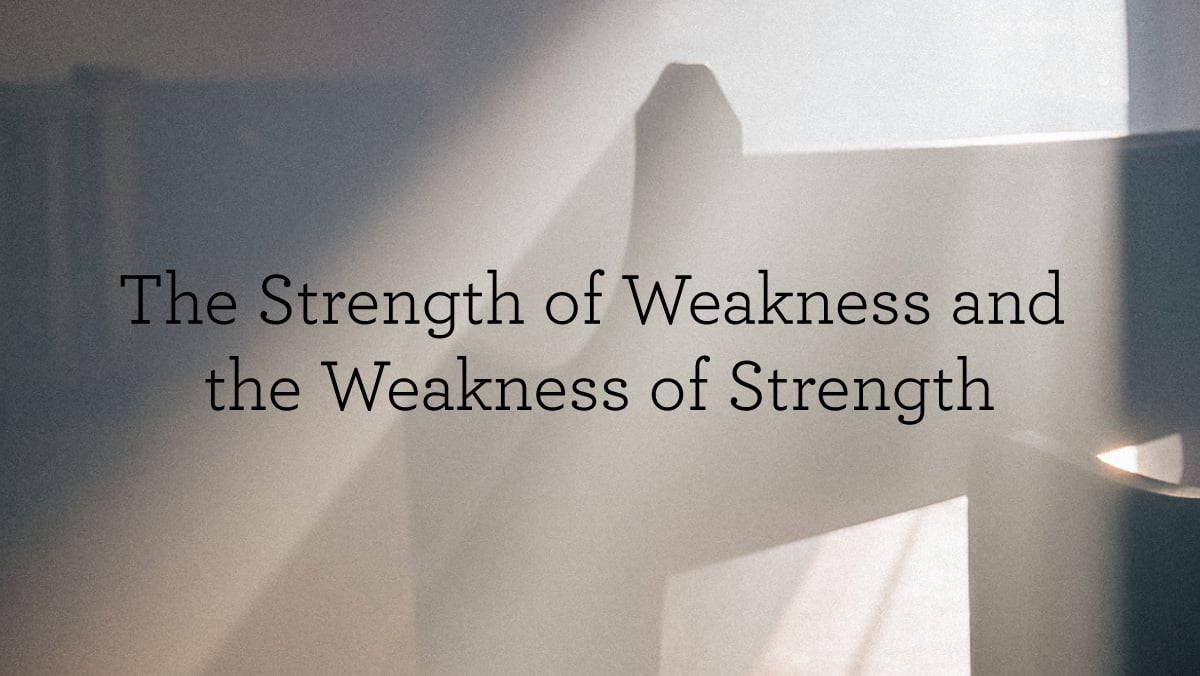
One the great tyrannies of our age is the lie that we will be most useful when we are as strong as we can be. We tell ourselves that God wants us to conquer all our challenges, to overcome the Evil One in frontal assault, to have our family and church and neighbors look to us and say, “Now there’s a strong servant of the Lord!”
This was certainly the mindset of Paul’s detractors in Corinth. We find in 2 Corinthians 10 that they were the type to exalt themselves. Yet they were measuring themselves by their own standards (v. 12). In contrast to them, Paul was content to speak of his weaknesses, because he had discovered that when he was weak, he was actually strong (2 Cor. 12:10). “I will boast all the more gladly of my weaknesses,” he said, “so that the power of Christ may rest upon me” (v. 9).
Pastors—indeed, all believers—today need to face this upside-down reality of the Scriptures: that there is a spiritual weakness in self-assertive strength, and there is true strength in the weakness of humble dependence. We need to discover the correlation between a pressing sense of personal inadequacy and God’s divine providence, which transforms weakness into sufficient strength for the purpose of His glory.
We can see the substance of this truth by considering two kings who ruled the kingdom of Judah and the contrast in the kinds of strength they embraced.
Jehoshaphat and the Strength of Weakness
One thing that is striking about the tradition of American football is the cheerleading. A team may show an abysmal deficit on the scoreboard, may be steamrolled across the field, and yet may still be subjected to an insistent chant from the sideline: “You can do it! You can! You can!”
In his day, Jehoshaphat, the fifth king to descend from David, faced a similarly impossible situation: an invading alliance of neighboring nations with whom he was unprepared to do battle. But there was no “You can do it!” in the court of Jehoshaphat. The king understood with absolute clarity that he had no hope of victory. There was only one place for him to turn.
There is a spiritual weakness in self-assertive strength, and there is true strength in the weakness of humble dependence.
Jehoshaphat showed not bravado but personal courage when he gathered the people together and admitted his inadequacy. Far from exalting his own ability, he led the people in a desperate prayer: “O our God …, we are powerless against this great horde that is coming against us. We do not know what to do, but our eyes are on you” (2 Chron. 20:12).
You won’t find that in most church growth manuals. Pastors are supposed to make sure they never get themselves to this point. But God’s purpose for us as His children is that we might depend entirely upon Him. Indeed, Jesus says, “Apart from me you can do nothing” (John 15:5). It is a mercy and a providence of God when He brings into the circumstances of our lives a battle—whether emotional or spiritual or physical or relational—that we cannot overcome, giving us the opportunity to come to Him and say, “I do not know what to do, but my eyes are on You.”
Is it possible that the reason so many pastors, church leaders, and believers today find themselves ineffective is not their lack of personal strength but rather their unwillingness to admit their personal inadequacy? It seems so obvious, but Christians need God—and our fellow believers and unbelieving neighbors alike need to see that we know and believe we need God! No culture, city, church, or life will know the transforming power of Jesus Christ on the strength of someone’s personal gifts alone.
God saved Jehoshaphat and Judah from the invading army. In doing so, He demonstrated that there is strength to be found in the humble, dependent weakness that turns in faith to our sovereign God.
Uzziah and the Weakness of Strength
Uzziah was the tenth descendent of David to rule Judah. By many standards, he was a sensation. Stepping into the place of responsibility at only sixteen years old, he took charge of all aspects of national life and put his mark on them for good. Whatever he turned his hand to, he was successful. His name even meant “The Lord is my strength,” and for a time, he lived up to it.
What was it that buoyed this remarkable man? First, he “did what was right in the eyes of the LORD” (2 Chron. 26:4). In the spirit of God’s great servants, he asked what was in accordance with God’s will, and he did that. Further, he “set himself to seek God” (v. 5), looking to the Creator to know right from wrong and depending on Him. And he did so, thirdly, under the instruction of Zechariah, who “instructed him in the fear of God” (v. 5), so that he was discipled in the context of godly fellowship. These all are marks of a godly man.
Is it possible that the reason so many pastors, church leaders, and believers today find themselves ineffective is not their lack of personal strength but rather their unwillingness to admit their personal inadequacy?
Uzziah’s success came from God’s hand—he was “marvelously helped, till he was strong” (v. 15). Yet there was a turning point in Uzziah’s life: “When he was strong, he grew proud, to his destruction.” In his pride, “he was unfaithful to the LORD his God” (v. 16). Uzziah entered the temple intending to personally burn incense—an act that may seem trivial to us now but that violated the clear instruction of God’s law and the counsel of the faithful priests.
At the beginning of his reign, Uzziah knew that God was his help. But at some point along the way, he began to conclude that he was the “it” factor in his success. Far from counting himself marvelously blessed, he simply counted himself marvelous. And the problem was an enlarged heart: “His heart was lifted up” (2 Chron. 26:16 KJV). He vaunted himself. He began to take to himself what was not his to enjoy. He was puffed up as a result of his self-focus. He squeezed God out.
Pastors and other church leaders have the awesome responsibility and privilege of shepherding God’s people by the crook of God’s Word and in utter dependence on God’s help. But when they begin to show signs of success and swallow the compliments they receive too eagerly, they are at risk of growing proud, to their destruction. A ministry that begins with humble dependence on God’s power can end with the sort of catastrophe that has visited so many who thought themselves above the possibility of failure.
As Uzziah attempted his unauthorized worship in the temple, God struck him with leprosy, forcing him to leave His presence and live in separation as an unclean man (v. 19) and overturning his legacy with subsequent generations (v. 23). In doing so, God taught us that there is a tremendous danger in personal strength and self-reliance, which can nourish pride that turns its back on God.
Embracing Our Weakness
If any early church leader was gloriously gifted in our estimation, it was Paul. We are well acquainted with his intellectual and ministerial successes, and it’s clear to us that he was mightily used of God in his day.
Yet Paul was careful not to boast in his own accomplishments, for he knew the danger of pride. He knew that any genuine experience of God is His gift of love to His children and provides us with no basis for self-exaltation. In contrast to his detractors in Corinth, Paul did not “dare to classify or compare” himself with others (2 Cor. 10:12). Instead he said, “It is not the one who commends himself who is approved, but the one whom the Lord commends” (v. 18).
Many are paralyzed in their ministry because they’re more concerned about what people have to say about them than about what God will say. What they need is not to seek after greater successes but to accept the hardships and failures that they are facing—emotional or spiritual or physical or relational—and pray the prayer of Jehoshaphat: “We are powerless! We do not know what to do, but our eyes are on you.” What many of us need is not for our hardships to be taken away but to hear the words Paul heard when he confronted the thorn in his flesh: “My grace is sufficient for you, for my power is made perfect in weakness” (2 Cor. 12:9).
As long as we have a modicum of misplaced hope in our own abilities, as long as we have a misguided conviction about our capacity for getting around or getting through challenges, then we will stay on our feet when we should fall on our face. And as long as we remain on our feet, we will never be able to lead and serve within our congregations in a spirit of humble dependence, as Jehoshaphat led and served Israel and as Paul led and served the fledgling churches.
The legacy of the strong man Uzziah was thrown away in a moment of pride. But the legacy of the powerless king Jehoshaphat is that he was a shepherd of God’s people who realized that there was strength in weakness. May it be the hallmark of all ministry in our age that those who conduct it would lead their people like Jehoshaphat did, bowing down with their faces to the ground in recognition that if dependence upon God is the objective, then weakness truly is an advantage for citizens of His kingdom.
This article was adapted from the sermons “The Strength of Weakness”, “The Power of Weakness”, and “The Weakness of Power” by Alistair Begg.

Topics: Articles